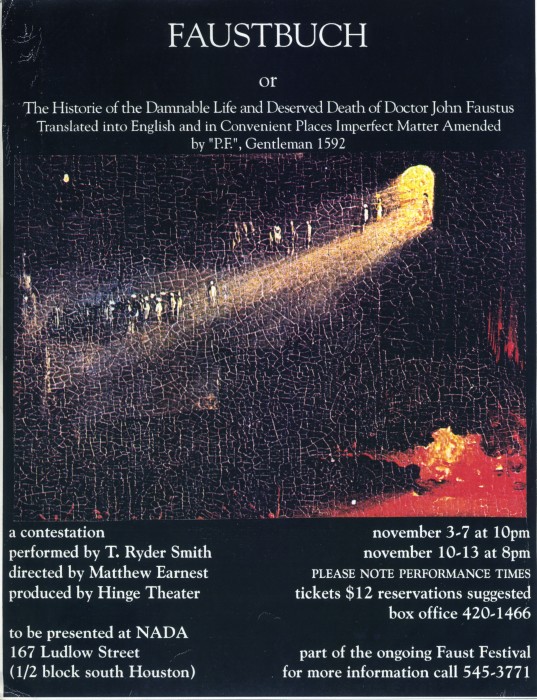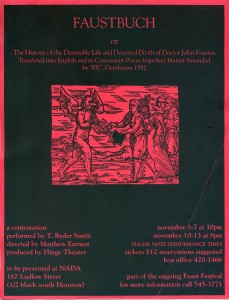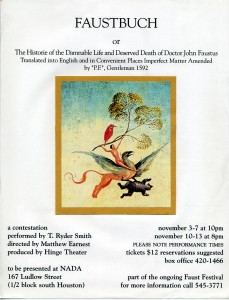Note
As part of NADA theatre’s Faust Festival, Aaron Beal had asked if I would care to read a few paragraphs of a curious Elizabethan text, said to be Marlowe’s source material. He wanted me to do about 10 minutes as a curtain-raiser to one of the several Doctor Faustus’ on the schedule. I read the excerpts and then tracked down the complete text (it has since been published and is much more readily available), and told Aaron I’d like to perform the entire piece. He added me to the schedule. I adapted the text, put the production elements together, and invited Matt Earnest – whom I’d met doing ‘The Misanthrope” – to direct.
Publicity
New York Times, Tom Ferrell – Which Will Be the Faustest With the Mostest? Is Faust a Good Second Act for Hamlet? Aaron Beall, the executive director of the Nada Theater in Manhattan, thinks so. At last year’s Hamlet Festival, he presented 31 productions involving the melancholy Dane. What, Mr. Beall wondered, about a pact with the Devil? The Faust Festival was born. Here is an annotated selection of the more than 50 productions scheduled between now and May. Information is available through the Faust Festival hot line, (212) 545-3771. “The Tragicall History of the Life and Death of Doctor Faustus,” by Christopher Marlowe The basic English Faust story: a triple Ph.D. — philosophy, law and divinity — has not brought happiness, so Faustus tries moral autonomy, the will to power and a 24-year service contract with Mephistopheles. He loses his soul, but Marlowe’s poetry leaves no doubt that he identified with his hero’s aspirations. An Arden Party production at the Nada Theater, 167 Ludlow Street (just south of Houston). Wednesday through Oct. 24. The first performance, and the official kickoff of the festival, is a benefit, followed by a party. “Faust Gastronome,” by Richard Schechner Goethe’s “Faust,” adapted — very adapted — by Mr. Schechner and his East Coast Artists. In Part 1, Faust is a chef, cooking up deviltry in his own hell’s kitchen; in Part 2, he’s a genetic engineer, telling the Nazis he knows a better way of improving the race. Music by Gounod and others. Currently at Riverside Church, Riverside Drive and 122d Street. Through Oct. 23. “The Tragedy of Doctor Faustus,” by Marlowe An adaptation that brings the play down to about 75 minutes and requires only five performers. Mephistopheles is played by a woman. Nada. Thursday through Oct. 24. “The Tragedy of Doctor Faustus,” by Marlowe again The entire so-called B text of 1616, much enlarged and augmented, especially the clown parts (Marlowe, 23 years dead by 1616, had lost control of what Jonson called his “mighty line”). Independent Theater Company at the House of Candles Theater, 99 Stanton St. Oct. 19-Nov. 26. “Christopher Marlowe: An Introduction,” by J. B. Steane A one-man show by Aaron Beall of Nada, who adapted the text from the introduction to the Penguin Classics paperback edition of Marlowe. Mr. Beall is an advocate of “found theater.” A world premiere. Nada. Oct. 20-30. “The Tragedy of Doctor Faustus,” still by Marlowe A cabaret approach to Marlowe, cast for eight men, all in basic black modern dress with accessories: one Faust, one Mephistopheles, six who manage all the other parts by doubling. With dancing and slapstick, but still a tragedy, and all dialogue authentically Elizabethan. High Noon Company at Nada. Oct. 27-Nov. 7. “The Historie of the Damnable Life and Deserved Death of Doctor John Faustus” The English Ur-Faust, a prose translation of the German “Faustbuch” of 1587, and Marlowe’s presumed source. Unlike Marlowe, it is highly moralistic, rejoicing in the fall of the upstart transgressor, much like the modern English tabloid press. A performance by T. Ryder Smith. Nada. Nov. 7, 10-13. “Faust and Phisto: A Musical Christmas Pantomime” The English Christmas panto corresponds to nothing we have in this country. There’s a plot and there are actors; there are lots of low topical jokes and asides to the audience; mature women are normally played by men in easily penetrable drag, Monty Python fashion; and the whole family goes, as the affair is considered a treat for the children. This text is from a 19th-century British pantomime. Nada. Dec. 19-24. “Faust,” by Johann Wolfgang von Goethe: The Serialization The big one, the great white whale of Weimar, about 12,000 lines, or the equivalent of some four Shakespeare plays. Presented by the Goethe Company, whose dramaturg, Douglas Langworthy, expects that 10 or 12 episodes will suffice. Nada. Begins Jan. 7. “Fist,” by Anna Kohler A performance piece for three actors by a Wooster Group associate; Faust from a woman’s point of view. “Faust” is the German word for “fist,” an accident of language that suggests what a contemporary woman’s point of view may be. Nada. Jan. 9-25. “Lucifer Distracted,” by Robert Auletta A fine American playwright’s two-act comedy about a woman who makes a pact with the Devil. In the end, Lucifer himself tears up the contract. Cast of two, the minimum for a contract. Nada. Feb. 9-26. “Wittenberg: An Explanation, or, Faust and Hamlet, and How They Got That Way,” by Robert Simonson What did Faust and Hamlet have in common? Right, they were both Wittenberg University men! As was Martin Luther. All three get together in this comedy that tries to account for Hamlet’s tortured personality. At the end, Hamlet gets word of a death in the family and has to go home to Denmark. Nada. Feb. 18-26. Four Faust Operas: “L’Histoire du Soldat,” by Igor Stravin sky Not really an opera; written as a narrated ballet about a soldier who gives his fiddle to the Devil and loses his soul in a card game. From a Russian folk tale chosen, according to C. F. Ramuz, the librettist, “perhaps for the very reason that it was so completely incoherent.” “Seven Deadly Sins,” by William Albright Also not really an opera but a narrated piece for chamber orchestra and one voice. Text from Marlowe’s pageant of the seven deadly sins in “Dr. Faustus.” “Who’s on Faust?” by George Zarr Faust meets Abbott and Costello in this 15-minute chamber opera whose two characters are a husband and wife at the breakfast table. A statement about high and low art seems to be intended, but where Faust is sublime, Abbott and Costello are sublime and ridiculous both. A world premiere. “Faust Triumphant,” music by Douglas Anderson, libretto by Andrew Joffe For 15 or 20 seconds in this very brief chamber opera, Faust, perpetual loser, triumphs over Mephisto, who appears as a beautiful woman and invites Faust to seduce her. He does, but after that it’s back to plain old hell again. Another world premiere. 10.9.94
[previous] [next]




